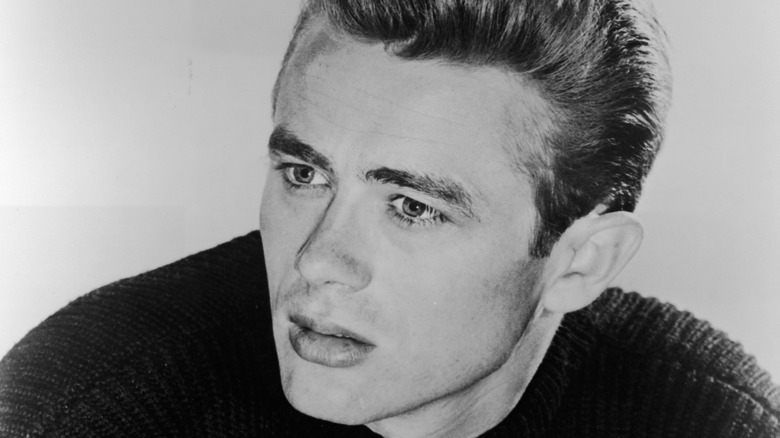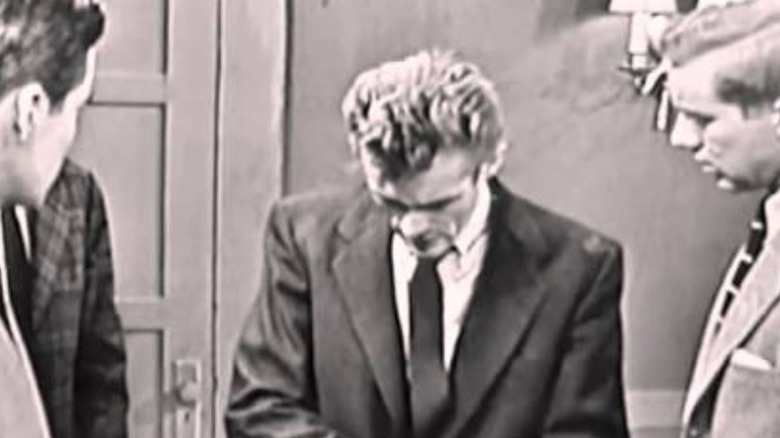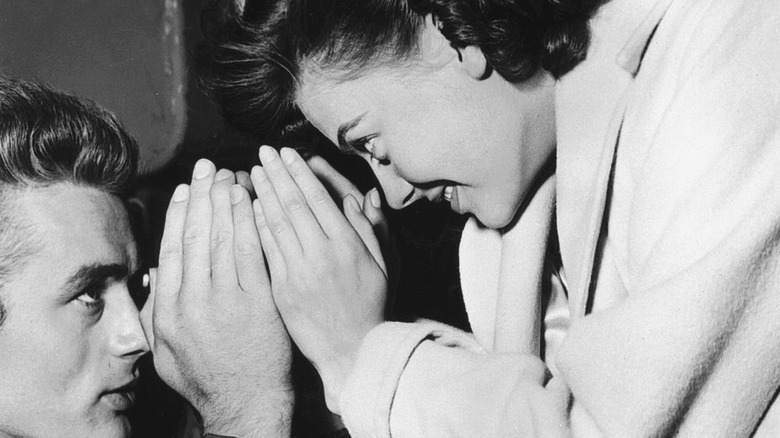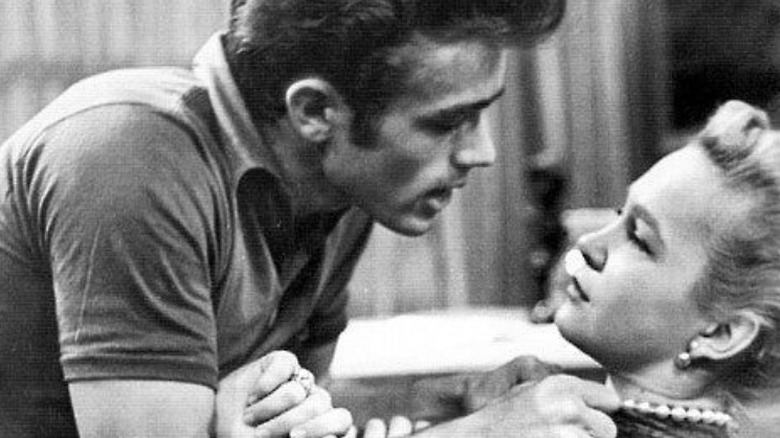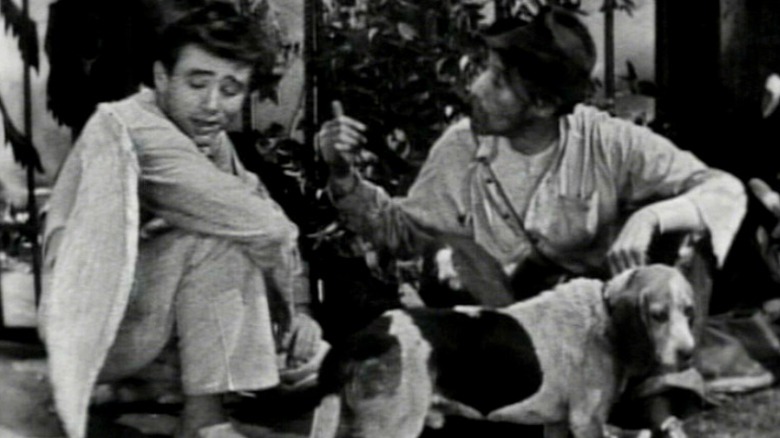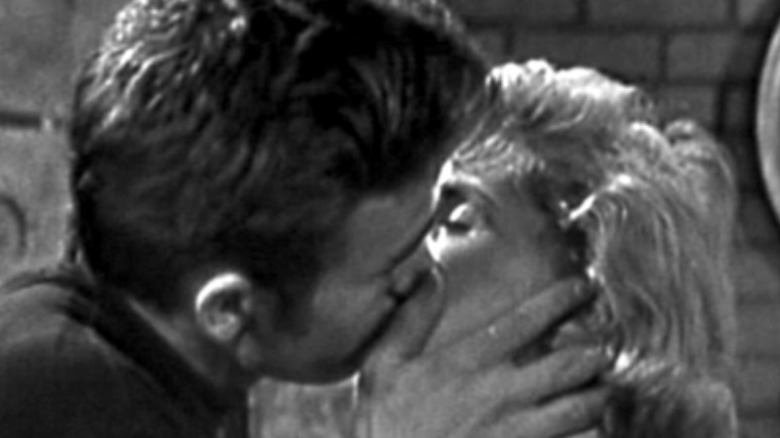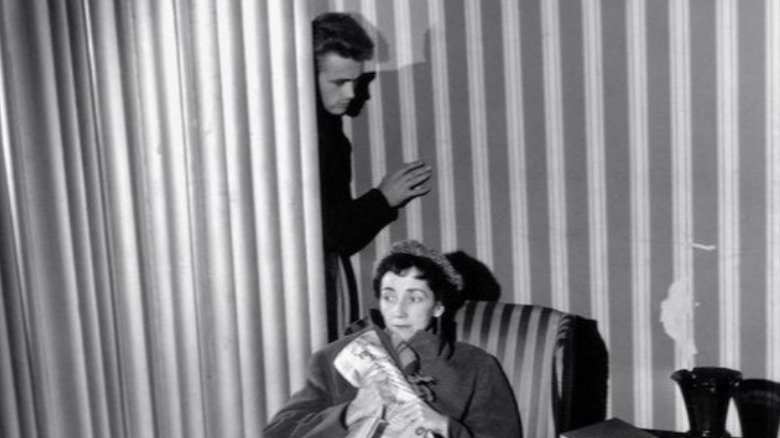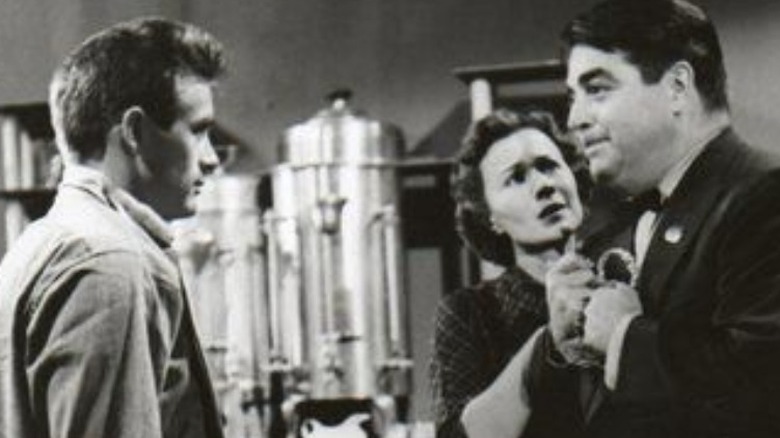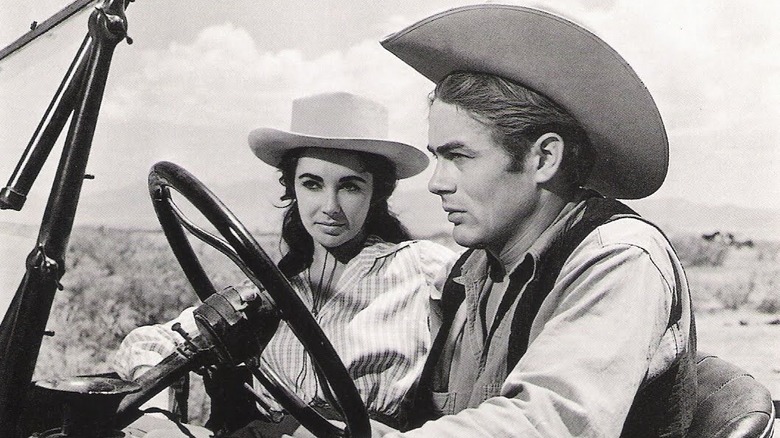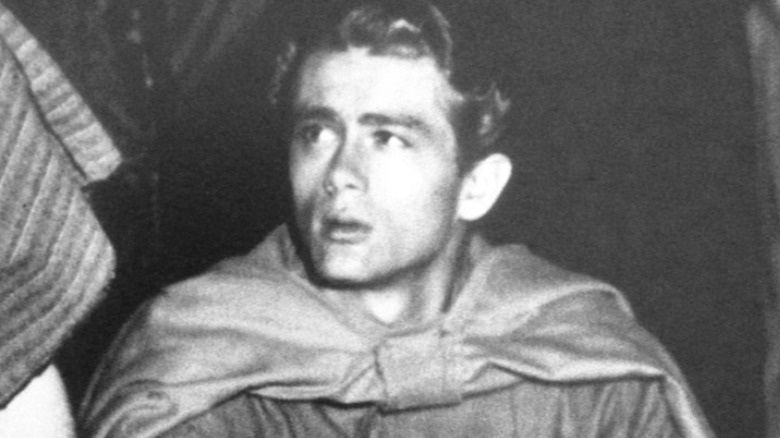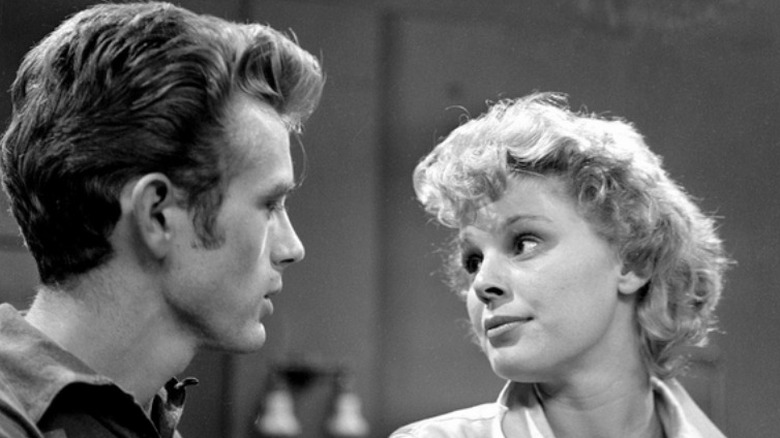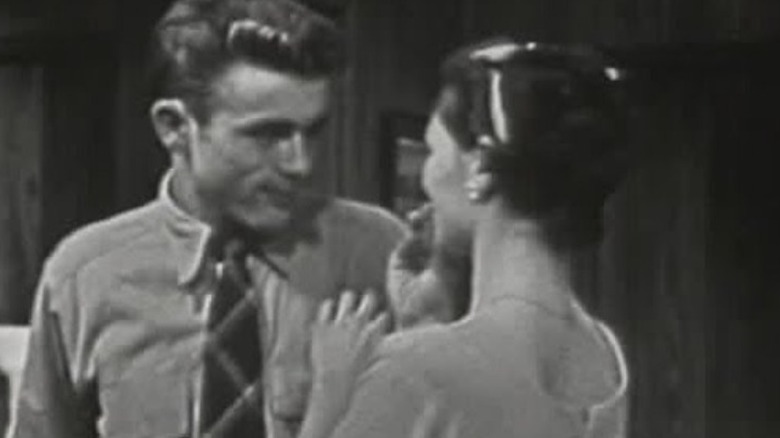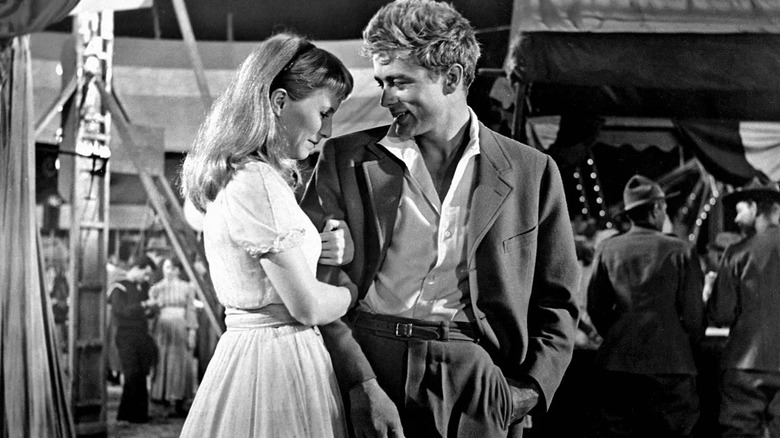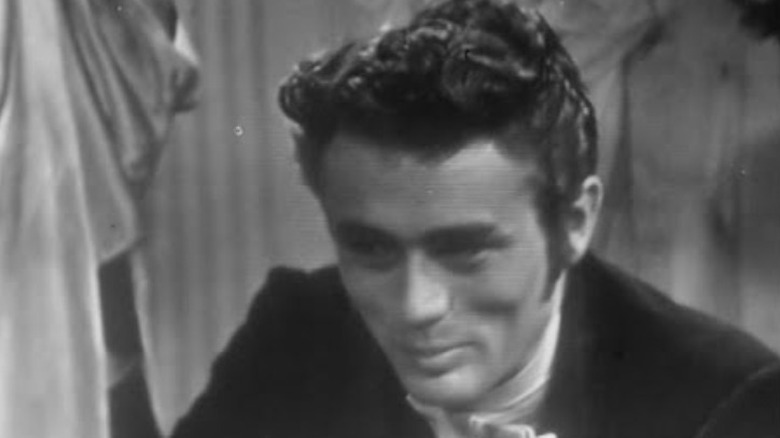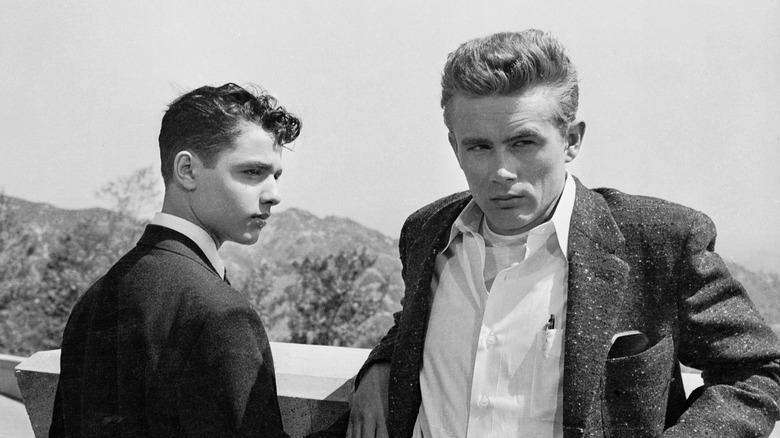James Dean's 7 Best And 7 Worst Roles Ranked
One of Hollywood's saddest stories belongs to James Dean, who skyrocketed to fame in 1954 and then passed away in a car crash just one year later. Born in the small town of Marion, Indiana in the throes of the Great Depression, Dean would move away from the country and eventually pursue acting. Before he played Cal Trask in "East of Eden," Dean spent three years cultivating dozens of credited and uncredited television and Broadway roles. He studied method acting under Lee Strasberg at the Actors Studio in New York City before moving to Hollywood and becoming a fleeting heartthrob in the City of Angels.
In just three feature films, Dean garnered a reputation for being an emotionally complex, vulnerable actor who delivered raw, genuine turns. In 1999, the American Film Institute named him the 18th greatest male movie star of all time, and after his early death he lives forever in cinema as an icon of tortured youth. To this day, thousands of fans flock to his hometown in Indiana to visit his grave and catch a glimpse of the farm he called home before leaving it in pursuit of stardom. Some of his television appearances only exist in chunks, while others are entirely unheard of, but his movies have endured as some of the greatest dramas of the 20th century. Here are James Dean's best and worst roles, ranked.
Worst: Kraft Television Theatre
In the first television program where Dean returned for multiple episodes, "Keep Our Honor Bright" is the weakest of the bunch. In the episode, Dean plays Jim Cooper, an undergraduate college student facing expulsion for cheating on an exam. After getting caught, Cooper quickly throws many others under the bus for cheating, too, and is tasked with outing all of them in an effort to save face and earn a chance to retake the exam.
Most of the other undergraduates involved, including Matt (Michael Higgins) and Sally (Joan Potter), members of the school's honor society, try to bully Cooper into recanting his inclusion of Sally in his testimony, and the "gang mentality" part of the episode wears thin quickly. The brightest part of "Keep Our Honor Bright" is, in fact, Dean, as he puts in a compelling performance as a young man being coerced into doing something that will benefit just the more privileged people around him. Only someone with the potential that Dean possessed could make a single character become so reviled and pitied with only two scenes of screen time.
Best: I'm a Fool
In a "General Electric Theater" production of "I'm a Fool," an adaptation of Sherwood Anderson's story of the same name, Dean collaborates with Natalie Wood for the first time. The two actors, as you might expect, share inimitable chemistry that predates their on-screen romance in "Rebel Without a Cause" by just one year. Dean appeared in another "General Electric Theater" episode one month later, which happened to feature future President of the United States, Ronald Reagan, but "I'm a Fool" is the better of the two, and one of the greatest dramatic turns of Dean's short career.
"I'm a Fool" follows a narrator (Eddie Albert) who tells the story of how he came of age, which includes leaving home at 18 and lying to impress a girl (Wood). Dean and Wood, who were 22 and 15 at the time, deliver vulnerable and honest performances that redeem a surprisingly flat turn from Albert, who eventually went on to earn Academy Award nominations for his roles in "Roman Holiday" and "The Heartbreak Kid."
Worst: Life Sentence
"Campbell Soundstage" offered Dean some of his earliest opportunities to hone his dramatic talents. In "Life Sentence," which aired in October 1953, Dean plays a felon, Hank Bradon, who escapes prison and is on the run. At times, Hank is as sympathetic as he is unhinged. Dean exhibits a range that's profound, especially for a low-stakes anthology series like "Campbell Soundstage." The full episode has never been unearthed, and nothing more than one scene has endured in the 60 years since it aired on NBC, which is why it lands here. If the full 30 minutes were available, it's a sure bet that it would go down as one of Dean's best roles.
Though only seven minutes of the original episode actually remain in existence, Dean employs some of his greatest acting traits. Hank is a complicated figure wrestling with the unromantic aspects of freedom, and Dean taps into the character's arc with a fervor that is as breathtaking as it is wobbly. Watching his delivery, you can sense that something is there. In fact, you know there's stardom lurking. Without the full episode, we'll never know just how powerful of a showcase it was for one of Hollywood's brightest flames.
Best: The Hound of Heaven
In the 1950s, NBC ran a variety show called "The Kate Smith Hour," hosted by Smith herself, who was a contralto also known as "The First Lady of Radio." Though she spent a lot of time in her later years on television, she is most notable for her rendition of Irving Berlin's "God Bless America." In a 1953 episode of "The Kate Smith Hour," Dean stars in a short skit titled "The Hound of Heaven," a play about reverse mortality, which gives him the chance to shine in an off-kilter, lighthearted role.
Dean plays "The Messenger" opposite John Carradine, who was a premier character actor at the time. Having grown up in rural Indiana, Dean was able to nail the sort of country twang needed for the part. Around the same time, Dean made a few appearances in primetime television roles, as well as an off-Broadway production of "The Scarecrow." "The Hound of Heaven" was his best role in 1953, though, as he is able to take a whimsical character like "The Messenger" and give it an over-the-top, charismatic glaze in such a limited space.
Worst: Something For an Empty Briefcase
Dean was often compared to his leather-clad peer Marlon Brando, and would sometimes turn in performances that felt like Brando rip-offs. In "Something For an Empty Briefcase," an episode of NBC's "Campbell Soundstage," Dean graces our screen like an extra straight out of "The Wild Ones" and "On the Waterfront." He plays Joe Adams, a theft-happy kid who wants a better future for himself, but his buddies won't let him leave a life of crime. It's not a substantial narrative, but watching Dean play a character with some depth and morals sheds showcases the potential evident even in his early career.
The most memorable part of the episode is also the biggest Brando homage, when Dean says "I wanna do something. I wanna be somebody." The only problem is that "Something For an Empty Briefcase" aired before "The Wild Ones" and "On the Waterfront" had even hit theaters. He wasn't a household name yet, but Dean's performance exudes the iconic attitude he's best remembered for. Unfortunately, this particular instance is somewhat less than worthy of his talents.
Best: Padlocks
In an episode of "Danger" that aired months after "East of Eden," "Padlocks" puts Dean in the driver's seat and lets him be his sultry self. Directed by Byron R. Kelley, Dean plays a felon on the run from the police. The twist, though, is that while fleeing, he stops to rob a reclusive old woman (Mildred Dunnock), who has a stash of priceless treasures. Dunnock turns in just as good of a performance as Dean, as her feisty, elderly delivery perfectly matches Dean's brooding, juvenile energy. The two actors feed off of each other to the utmost extent and reward audiences with a half-hour of thespian magic.
"Danger" was a good piece of dramatic primetime television that ran for five years and, to date, "Padlocks," which was Dean's first episode in the series, remains its highest rated on IMDb. Soon after "Padlocks" aired, Dean won small roles in two General Electric Theater productions that featured Natalie Wood and Ronald Reagan, respectively, before heading to the "Rebel Without a Cause" set.
Worst: Run Like a Thief
"Run Like a Thief," an episode of "Philco Television Playhouse," was Dean's first television performance after "East of Eden" premiered earlier that year. Quickly assimilating into a role as one of Hollywood's biggest heartthrobs, seeing Dean in such a small, inconsequential production initially feels alien. What's even more unfathomable is that just a little over one year later, Dean would be dead. His rise to stardom was one of such a palpable, quick ascent that seeing him in a small-time, barely primetime role reinforces how tragically fleeting it would ultimately be.
Dean's portrayal of Robbie Warren, a protege of Alexander Ingles (Kurt Kasznar), a maitre d' at a five-star resort, is one that doesn't strike too many chords. It must be noted that at the time, Dean's acting chops were still growing and as a result, his raw, unflinching delivery steals the show. Yes, he was punching below his weight class here, but, thankfully, "Rebel Without a Cause" was right around the corner for him.
Best: Giant
In his last on-screen performance ever, Dean portrays Jett Rink, an ambitious, young Texas rancher, in George Stevens' 1956 adaptation of Edna Ferber's 1952 novel, "Giant." Dean stars opposite Rock Hudson and Elizabeth Taylor, who were both A-list stars in Hollywood's Golden Age.
In "Giant," which covers numerous years over the film's three-hour-plus runtime, a wealthy Texan Bick Benedict (Hudson) and his lover Leslie Lynnton (Taylor) face a rapidly changing ranching industry that's impacted by a boom in oil. The heart and soul of the film, however, is the rivalry between Benedict and Rink, who are polar opposites, but each wants to succeed and find fortune in pursuit of the American Dream. Like "Rebel Without a Cause," "Giant" was preserved in the United States National Film Registry by the Library of Congress, and it remains Dean's most daring, heartfelt, and charismatic performance.
Dean garnered a second posthumous best actor Academy Award nomination, but lost to Yul Brynner. Hudson was also nominated for best actor. To date, Dean is the only person to receive multiple nominations after death, which is one of the ultimate testaments to the impact he had by the time of his passing. What the future held for him is forever unknown, but at least we have "Giant" as his final curtain call.
Worst: Hill Number One: A Story of Faith and Inspiration
In his first syndicated television appearance, Dean played a role in Jerry Fairbanks' "Family Theater." The actor was fresh off a number of Pepsi commercials, but hadn't yet acquired a bona fide on-screen credit. "Family Theater" was a small-time production, but Dean's episode, "Hill Number One: A Story of Faith and Inspiration," was broadcast in 1951, focusing on the story of the Twelve Apostles told through a US Army company stationed in Korea during the war.
Dean was a newcomer here, surrounded by veteran faces, like Jeanne Cagney and Gene Lockhart, but he held his own with an obvious raw potential that he'd soon hone. Though it's a good performance by Dean, "Family Theater" was never a heavyweight television program. Dean's turn as John the Beloved, however, inspired the teenage girls of Immaculate Heart Catholic High School to form the Immaculate Heart James Dean Appreciation Society a full four years before he became a Hollywood star.
Best: Death Is My Neighbor
In the best of his four episodes of "Danger," Dean plays J.B., a new tenant in a New York City apartment building who gives his supervisor too much grief. Dean stars alongside Walter Hampden, who was one of the greatest stage actors of his time and, by the time of "Death Is My Neighbor," had already amassed a prolific filmography, which included roles in "Sabrina," "All About Eve," and "The Hunchback of Notre Dame." Betsy Palmer, who later achieved a late-career renaissance in "Friday the 13th," appears as the leading woman, and delivers a terrific performance.
Hampden, who was in the later years of his life, was noticeably meticulous in his line deliveries, which contrasted with Dean's youthful, naturalistic energy. That dynamic, luckily, matched the eeriness of the story's plot, and in turn, helped create one of Dean's best television performances. His portrayal of J.B. was one of unrelenting scene-stealing. The 22-year-old was becoming more polished in his delivery and so, too, was primetime television. Watching the actor and his medium both grow into their potential is incredibly rewarding, and Dean would soon infuse that energy into his first film role.
Worst: Robert Montgomery Presents
In the role of Paul Zalinka in "Harvest," an episode of NBC's "Robert Montgomery Presents," Dean does his best to soldier through one of the weaker entries in the Emmy-nominated anthology series. Montgomery, the former president of the Screen Actors Guild, hosted every episode, but not every story ended up a winner. In "Harvest," Dean plays the youngest son of a farming family.
Over the course of the episode, which is a Thanksgiving special of sorts, there is a lot of loss, ranging from a hailstorm that wipes out the Zalinka family's wheat crops, to the family's patriarch passing away just before his 100th birthday. Dean, who grew up on a farm in Indiana himself, might have tapped into his own roots to deliver a kind and memorable role that appears, at least on the surface, well-suited for his talents. But the story itself is messy and tries to traverse a hefty amount of plot in far too little time.
Best: East of Eden
In his first-ever role in a major motion picture, Dean plays Cal Trask, the son of a California farmer, Adam (Raymond Massey), in Elia Kazan's 1954 adaptation of John Steinbeck's 1952 novel, "East of Eden." Cal worries that Adam favors his other son, Aron (Richard Davalos), and decides to dive into the bean-growing business in an effort to win Adam's favor. "East of Eden" deals with mortality, loss, and father-son relationships as good as any film from its era, and putting faith in the raw, unpolished Dean was a risk taken by Kazan that bestowed riches far beyond the monetary successes of the production.
Dean, alongside Davalos, gives a captivating and deeply touching performance. Kazan's use of CinemaScope color puts a poignant stamp of beauty on already rich source material. Though Dean's mannerisms are comparable to Marlon Brando's, there's something about Dean's motivations and projections that go above and beyond those of Brando's. Dean would eventually garner a posthumous best actor Academy Award nomination for his role, although he lost out to Ernest Borgnine. You could argue Dean's loss was a snub by the Academy, but not even that could diminish what an important and groundbreaking performance it truly was.
Worst: Forgotten Children: A Historical Biography
"Forgotten Children," an episode of the CBS "Hallmark Hall of Fame" series, is not much of a memorable one for Dean. His appearance is brief, as he plays a Southern man named Bradford, but the story is centered around that of Martha Berry (Cloris Leachman), a teacher who educates impoverished children in Georgia immediately after the Civil War. Its depiction and presentation of the South are reminiscent of that in "Gone With the Wind," but that's as far as the comparison can go. Dean's appearance is brief, but his character's interactions with Martha are somewhat essential to furthering her story, as Bradford is an immoral person standing in the way of her work.
"Forgotten Children" is one of the few entries in this list where James Dean isn't a clear standout in the cast. Instead, its best parts are because of Leachman's talent and command of her scenes. Around the same time, Dean was playing a supporting role in a Broadway production of "See the Jaguar," alongside Arthur Kennedy and Constance Ford. That performance was a better utilization of Dean's thespian talent, but "Forgotten Children" is still memorable, offering him a chance to play a character wildly different from the ones he was used to playing.
Best: Rebel Without a Cause
In perhaps his most famous role, Dean turned the world upside down with his portrayal of Jim Stark in Nicholas Ray's "Rebel Without a Cause" in 1955. Sporting his trademark red jacket and cuffed jeans, Dean was already a star, but the film being released into theaters just one month after his death turned him into an icon. "Rebel Without a Cause" is the only production in which Dean takes top-billing, and no other actor could've made Jim Stark such a lasting, memorable character.
The troubled Stark and his family have just moved to a new town in Southern California and he's hoping for a clean slate, but he gets caught up with the local tough guy, Buzz (Corey Allen), and his pack of violent cronies. "Rebel Without a Cause" is Dean's show, but it also features scene-stealing performances from Natalie Wood and Sal Mineo. There's death, regret, and lost innocence across the entire film, and Dean pumps an electric yet heartbreaking sense of uncertainty and hope into Stark. Though it's his only feature film he didn't receive an Academy Award nomination for, it's most certainly his most memorable.
